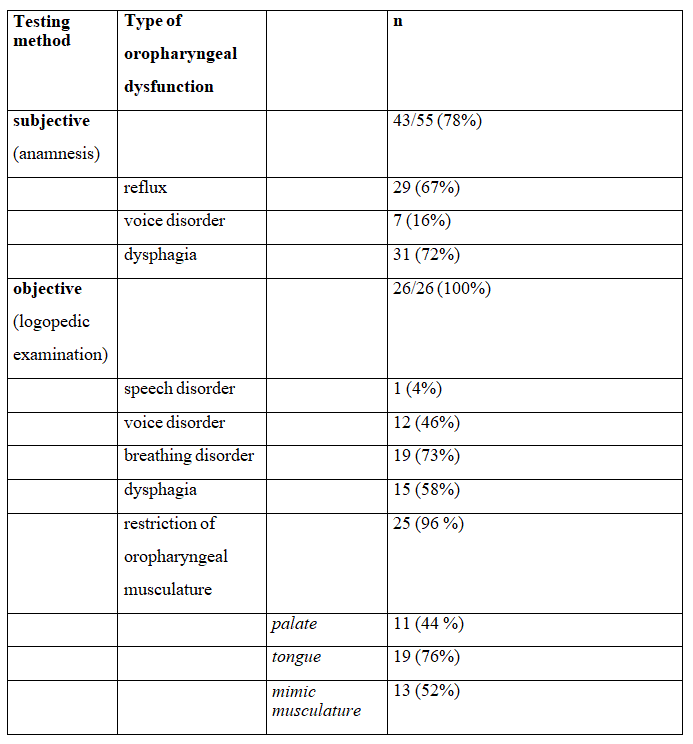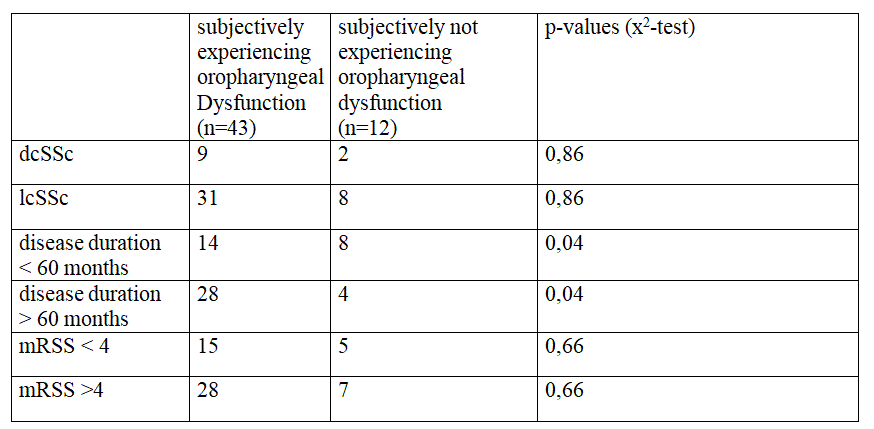Session Information
Session Type: Poster Session B
Session Time: 9:00AM-11:00AM
Background/Purpose: Nearly 98% of patients with systemic sclerosis (SSc) are suffering from gastrointestinal involvement (Schmeiser et al. 2012). While in everyday clinical practice screening for reflux and gastrointestinal dysmotility is part of the routine procedure and evidence-based treatment options exist (Mercado et al. 2005; Boeckxstaens et al. 2002), screening for oropharyngeal dysfunction is rarely done nor adequately treated. In 2012, a study of the German Network of Systemic Scleroderma (DNSS) showed, that about 78% of patients reported hoarseness and/or chronic cough. As oropharyngeal dysfunction (e.g. voice dysfunction, dysphagia) can significantly affect quality-of-life and lead to social stigmatization, we initiated a study (DRKS00020776) to address this problem.
Methods: We examined patients with systemic sclerosis using a self-constructed questionnaire and a standardized logopedic examination for signs and symptoms of oropharyngeal dysfunction (e.g., speech disorder, voice disorder, reflux, dysphagia), restrictions of the oropharyngeal musculature (palate, tongue, mimic musculature) and breathing disorders. If any of these were positive, oropharyngeal dysfunction was diagnosed. Furthermore, we analysed, if these findings were associated with specific disease characteristics.
Results: Of 55 patients with SSc fulfilling the inclusion criteria, 55 patients agreed to screening for oropharyngeal dysfunction (medical history and physical examination).
43 out of 55 (78%) SSc patients described at least one symptom of oropharyngeal dysfunction: dysphagia (72%), reflux (67%) and/or voice disorder (16%). In physical examination, 43 out of 55 (78%) patients showed also an oropharyngeal dysfunction.
Neither the subtyp of SSc (d/lcSSc) nor the extent of skin fibrosis (mRSS) were significantly associated with the manifestation of oropharyngeal dysfunction. In contrast, a statistically significant relationship between duration of illness and the manifestation of oropharyngeal dysfunction could be found.
26 out 55 patients received an additional logopedic examination. Of these, 26 out of 26 patients (100%) showed to have at least one type of oropharyngeal dysfunction (table 1). Most striking was the altered function (limitation) of oropharyngeal musculature in 25 out of 26 (96%) cases.
Conclusion: Although it is known that nearly all patients with SSc have an involvement of at least one part of the gastrointestinal tract, examination for oropharyngeal dysfunction is rarely done. The data of our study indicate, that independently of the subtype of SSc, this complication is more frequent than expected, increases with the duration of the disease and should therefore be implemented in the standard routine diagnostics for SSc.
 Frequency und type of oropharyngeal dysfunction
Frequency und type of oropharyngeal dysfunction
To cite this abstract in AMA style:
Klemm P, Wirths M, Hudowenz O, Hoffmann U, Müller-Ladner U, Lange U. Oropharyngeal Dysfunction in Patients with Systemic Sclerosis – Results of a Monocentric Clinical Study [abstract]. Arthritis Rheumatol. 2020; 72 (suppl 10). https://acrabstracts.org/abstract/oropharyngeal-dysfunction-in-patients-with-systemic-sclerosis-results-of-a-monocentric-clinical-study/. Accessed .« Back to ACR Convergence 2020
ACR Meeting Abstracts - https://acrabstracts.org/abstract/oropharyngeal-dysfunction-in-patients-with-systemic-sclerosis-results-of-a-monocentric-clinical-study/

